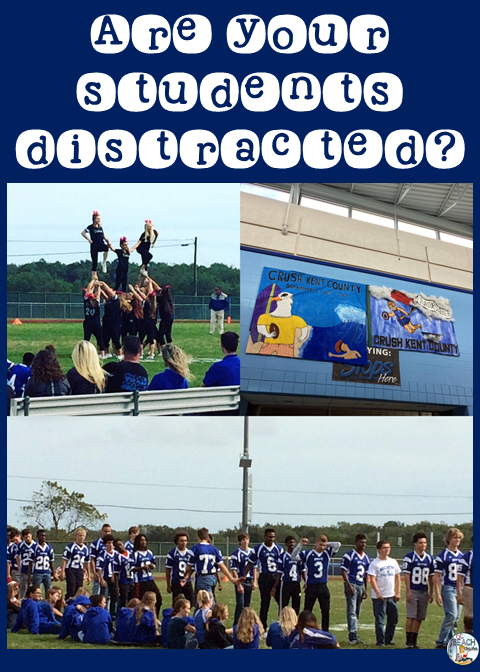High school life is busy…last week our school celebrated homecoming, and as usual, everyone was distracted by “dress-up” days, evening activities (class competitions, a talent show, a teacher-student volleyball game), voting for the homecoming court, and of course, the dance. To say the least, it made teaching challenging!
New Teacher Mistakes
When I was a new teacher, I never paid attention to special times of the school year- whether they were traditional holidays, special field trips, popular dances, or important sports competitions. I took myself and my job too seriously- expecting that nothing would interfere with my students’ learning. Unfortunately, I had the mindset that students were in school to learn, and they needed to manage themselves better if life distracted them.
Of course, this didn’t make me a very successful teacher during these times, but fortunately I’ve learned from my mistakes! Over the years, I’ve realized that teachers need to be flexible. I was a student once, too, and even though it was a long time ago (a really long time ago), I remember how exciting these special times of the school year were, so I shouldn’t fault my students for being distracted. Instead, now I try to help them manage their enthusiasm for these activities while they also continue to learn.
Tips for Managing Distractions
Here are a few strategies that I use to help make these weeks manageable:
1. Acknowledge there is a distraction and plan ahead! It’s not the wisest decision to make the Monday after homecoming weekend (or Halloween, or Thanksgiving, or prom, etc.) the due date for a major assignment or project. The reality is that many students will not complete the assignment. Then you will have to decide if you’ll let students submit it as a late assignment or fail the project. If they fail, are they learning? Ultimately, adding a day or two to the deadline and making the due date on the Tuesday or Wednesday after a special weekend gives them a weeknight or two to finish homework and will result in less stress and hassle for you and the students.
Parents will also appreciate this forward-thinking. For instance, at holidays, many parents struggle to balance travel plans with school schedules. They will thank you for making it so their children don’t have to stay up late into the night after arriving home from a delayed flight at 10:00 p.m. on a Sunday.
 2. However, it’s still important to keep students accountable during these weeks. (Yes, I know that I just said I loosen up due dates but it’s still important to set the expectation for learning). Although it’s important to recognize the holiday or event taking place, and maybe even incorporate a few fun activities, it’s important to continue with lessons from the regular curriculum. In my classes, students have vocabulary assignments every day, and I make sure to collect them. We also continue our weekly grammar and reading lessons. I often choose an interesting story such as “The Story of an Hour” or “The Lottery” that requires critical thinking to help them stay focused.
2. However, it’s still important to keep students accountable during these weeks. (Yes, I know that I just said I loosen up due dates but it’s still important to set the expectation for learning). Although it’s important to recognize the holiday or event taking place, and maybe even incorporate a few fun activities, it’s important to continue with lessons from the regular curriculum. In my classes, students have vocabulary assignments every day, and I make sure to collect them. We also continue our weekly grammar and reading lessons. I often choose an interesting story such as “The Story of an Hour” or “The Lottery” that requires critical thinking to help them stay focused.
With my high school students, I also talk with them about planning ahead. (In fact, at the beginning of the school year, I use problem-solving writing prompts to help them prepare for upcoming challenges.) For example, I tell them that they may want to complete their upcoming vocabulary index cards during the weekend before a spirit week or holiday. (I give them this advice when they will have a busy week at after-school jobs or in sports, too.) This way they can enjoy the evening activities that take place during our homecoming week. No doubt, this is a helpful life lesson for the many events that will distract them in their futures at college and in work.
3. Participate in some of the fun. I probably shouldn’t admit this, but I honestly don’t feel that excited about homecoming anymore. (Between being a high school student and teacher, I’ve participated in 20 homecoming weeks and numerous dances.) However, I still want to connect with the students and show my school spirit.
 Therefore, I choose a few days to dress-up for during the week. My students notice that I’m taking part in activities that happen outside of English class, and it opens conversations with them about their interests, hobbies, and life outside of school. Even though I think my English class should be the center of everyone’s attention (haha), lots of my students, parents, and other staff members won’t agree. They have their own interests and priorities, and it’s important to accept that. As you can see, my colleague and I dressed up for “Twins Day.”
Therefore, I choose a few days to dress-up for during the week. My students notice that I’m taking part in activities that happen outside of English class, and it opens conversations with them about their interests, hobbies, and life outside of school. Even though I think my English class should be the center of everyone’s attention (haha), lots of my students, parents, and other staff members won’t agree. They have their own interests and priorities, and it’s important to accept that. As you can see, my colleague and I dressed up for “Twins Day.”
4. Maintain regular routines. I believe that structure and routines are beneficial to my students’ learning. They know they can expect certain warm ups, lessons, and activities on specific days of the week. For example, they know that I always start with journal writing on Mondays and that we begin class with silent sustained reading on Tuesdays and Thursdays. This helps me plan my semester and provides consistency.
As much as possible, I maintain these routines during special weeks during the school year. Sometimes those weeks and events make them anxious. (They may be worried about who they’ll go to the dance with or what they will wear to Homecoming.) When students know there are daily routines and expectations, it actually helps calm their nerves. Structure at school also helps me meet some of their emotional needs.
I hope by sharing some of my previous challenges and how I’ve learned to deal with them, you can avoid some of the pitfalls I’ve had in past years. What advice do you have for keeping students focused during the holiday season or other eventful times during the school year? I’m always interested in new ideas so please share in the comments below!




